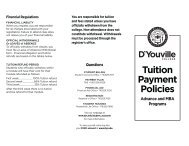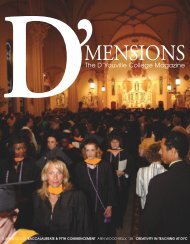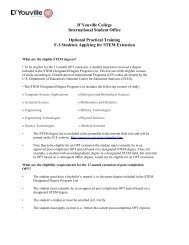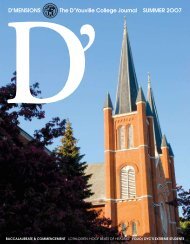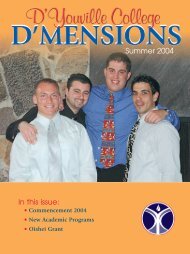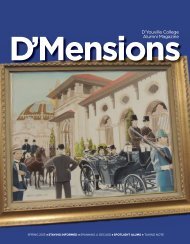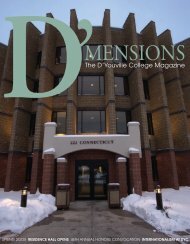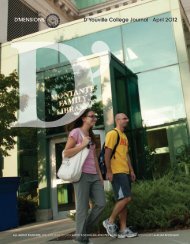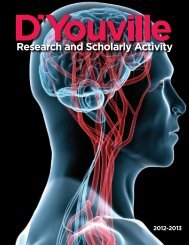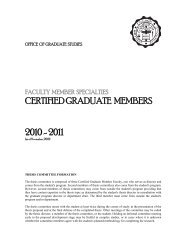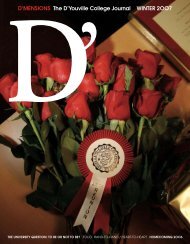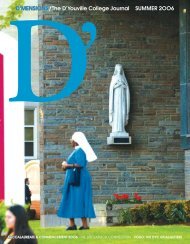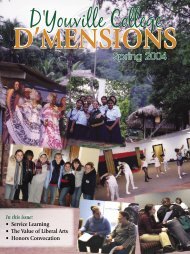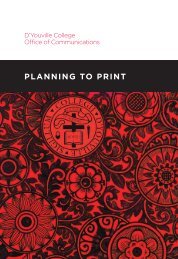d'mensions D'Youville college Journal august 2o11
d'mensions D'Youville college Journal august 2o11
d'mensions D'Youville college Journal august 2o11
- No tags were found...
You also want an ePaper? Increase the reach of your titles
YUMPU automatically turns print PDFs into web optimized ePapers that Google loves.
student outcomes across communities are consistent with otherbureaucratic historical trends. I believe that standardization itselfis not the problem but that their current composition, alignment orbenchmark reforms are detrimental to the field of science becausethe creation process, the content and the uses of standards areinaccurate representations and applications of the best sciencethat public schools have to offer society. As such, these reformsundermine the future of science and its teaching: I disagree withthe way the whole standardization process is happening and I amespecially concerned that the way science curriculum is beingregulated will make science less democratic and more boring tothose students who didn’t like it before. Scientists should resist thedistortions that occur in and as a consequence of these initiatives.Resistance to the inaccuracies spread through these reforms requiressetting in motion a fundamental reconstruction of the profession ofscience, in addition to a reconstruction of schooling. A relationaland harmonizing reform agenda is needed. Reconstruction throughresistance to these particular forms of standardization will allowscience to redefine and reinvent what it is and how it can best betaught in society, especially to society’s youngest members.A DEFINITION OF SCIENCE n Science is a culturally based and selfcorrectingempirical system for understanding the physical worldof the peoples in various cultures and is directed toward thecontinuation of both the cultural and physical world. This definitionrecognizes the cultural diversity of science in the historical record ofhumans and across the globe now. Science is older than its dominantversion imported to America from Europe and science exists inmany cultural forms today within and beyond North America. At itsbest, science in any form is an active, collective search for truth anddynamic reflection of empirically informed knowledge respectedfor its restorative and enriching qualities. This description ofscience is based on insights from researchers of indigenous science, 1feminist empiricism, 2 and related social aspects of the epistemologyof science education. 3Recognizing the many lenses and practices of science would meancomparing perspectives and asking questions of the discipline. Ifscience as a profession is full of rich debates and distinct branchesof its family tree, why aren’t all cultures within the 235 yearhistory of the United States more proportionally represented in it?What happens to the complexity of views, techniques and issueswithin science when they enter public schools? How might sciencealter itself to become more accessible to society than it has been,including its public schools? These kinds of questions can, andshould, be debated during the process of developing educationalgoals and standards. Entrenched in the current proposals is the longstandingexclusion of the issue of who gets invited to participate indiscussing questions about the value of science to society.A POTENTIAL CURRICULUM ALTERNATIVE n This curriculum proposal,which was explored during my 2010 fellowship in Spain, is theresult of collaboration by a sociologist (myself as a visiting scholar),a middle school physics teacher and an engineer who had children inthe physics teacher’s classroom. A parent employed as an engineerat a national science center had been inspired by his daughters’1Snively & Corsiglia, 2000; M. Ogawa, 2006; Aikenhead & M. Ogawa, 2007, 2 Haraway,1989; Longino, 1990; Nelson, 1990; Harding, 1991 & 2005; Cancian, 1992; Rolin, 20043Loving, 1997; Weinstein, 1998; Roth & Lee, 2002; Knight & Collins, 2010middle school science teacher to become involved in the scienceclass. The engineer mobilized his aerospace engineering colleaguesto collaborate and create innovative “flight loads testing” lessonsfor the class. The lessons illustrated the engineers’ daily work inthe laboratory. The lessons also described what coursework ortraining helped them become engineers and why they had chosenengineering. The engineers personally visited the class to discussthese topics. They also constructed a live, remote, Internet linkto their engineering laboratory. With this link, students couldsee and talk to more engineers who were located in that lab andstudents could direct those in the lab to conduct student-designedexperiments while immediately graphing the data. The “lab”was programmed using computer software common to <strong>college</strong>engineeringcoursework. The engineers designed career discussionsusing their own biographies to illustrate how they got to and through<strong>college</strong>s of engineering. I knew these topics were absent from thecurrent science standards. Obviously, the teacher was brave andprofessionally safe enough to invite visitors into his classroom andhe was confident enough to alter the school curriculum accordingly.The goals of this curriculum model are threefold: (1) to increasethe number and quality of future scientists by inspiring them asearly and often as possible in school, (2) to increase the value ofscience classes for anyone seeking high school graduation and(3) to foster the professional development of science teachersso they can cultivate a campus environment for the public toshape curriculum. The framework has three dimensions: scienceknowledge, science career paths and scientists’ biographies.Subject knowledge, attitudes and skillsn Science & math & technology contentn Scientific research practices & ethicsCareer & school action plansn Deciding where I want to go in life; becoming self-drivenn Becoming socially responsible about the uses of sciencen Getting from middle school/high school to <strong>college</strong>;requirements and helpPeople who are role modelsn Who makes science happen; biographies and “sciencefamily trees” of scientists past & presentn Why science is central to citizenship & society; imaginingthe work of future scientistsD’Youville is in a unique position locally to train scientists who canexplain their craft to the public, to encourage writers who can sparkpublic imagination about science, and to engage philosophers whocan untangle ethical dilemmas in science. The liberal arts and teachereducation programs that have been on campus for a century can bea fine resource for the more recent and expanding science-basedprograms. And vice versa. That’s my idea of a great education. nalumni.dyouville.edu 13



